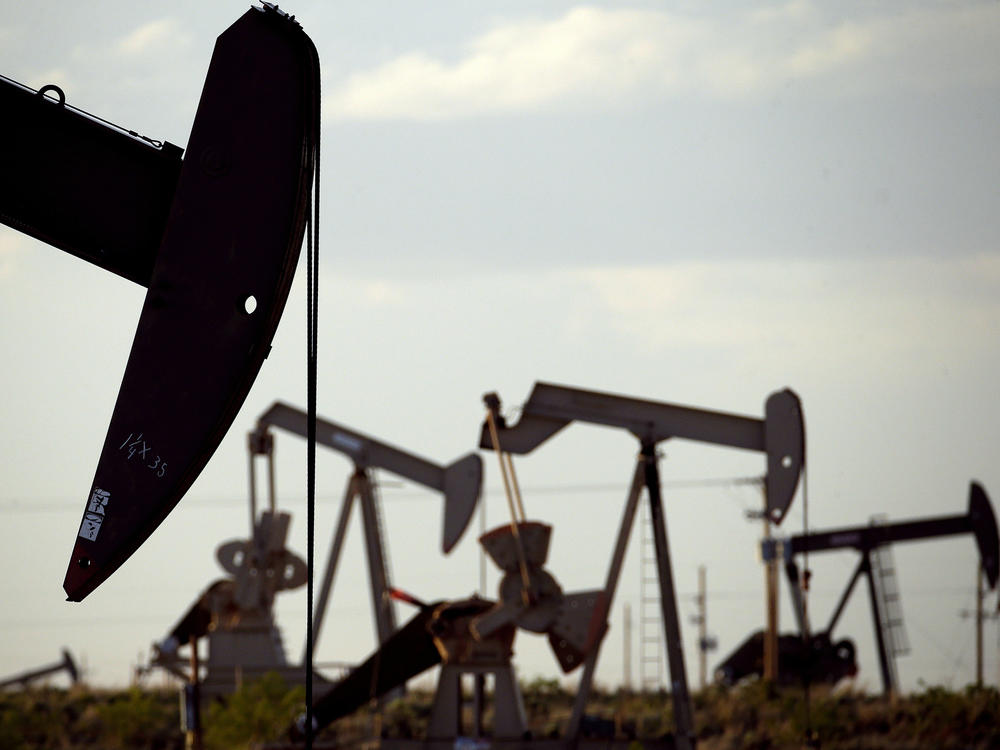Section Branding
Header Content
Trump's Methane Rollback That Big Oil Doesn't Want
Primary Content
Updated at 4:40 p.m. ET
Despite opposition from the oil and gas industry it aims to help, the Trump administration is rolling back an Obama-era rule designed to reduce climate-warming methane emissions.
Methane is the main ingredient in natural gas. But when it's released before it burns, say from a leaky valve at a drilling site, it's far more potent than carbon dioxide. According to the Environmental Protection Agency, the oil and gas industry is the largest source of methane emissions in the United States.
The Trump administration rule would eliminate a 2016 requirement that oil and gas companies monitor and limit methane leaks from wells, compressor stations and other operations.
Environmental Protection Agency Administrator Andrew Wheeler announced the change in Pittsburgh, the heart of gas drilling region in Pennsylvania, a state that voted for Trump in 2016 but is leaning Democratic this year.
Wheeler said the new rules deliver on President Trump's 2017 executive order to promote energy independence and economic growth.
"EPA has been working hard to fulfill President Trump's promise to cut burdensome and ineffective regulations for our domestic energy industry," he said.
When the proposed rule was announced last year, the administration estimated the rollback would save the oil industry up to $19 million a year in compliance costs. At that time, Wheeler also echoed an oil industry talking point that "methane is valuable, and the industry has an incentive to minimize leaks and maximize its use."
Under the EPA's new regulations, methane will be regulated indirectly through another rule aimed at limiting volatile organic compounds from being emitted.
But some large oil companies want the Obama rules left in place.
Shell, BP and the Exxon Mobil Corp. have big natural gas portfolios. They worry that if methane emissions aren't controlled that could undermine arguments that natural gas is a cleaner-burning fossil fuel than coal.
"The negative impacts of leaks and fugitive emissions have been widely acknowledged for years, so it's frustrating and disappointing to see the administration go in a different direction," said Gretchen Watkins, Shell's president in the United States.
Watkins said her company will continue with its plan to reduce methane emissions. The oil industry is split on this though, as smaller companies say the requirements are too expensive for them.
Oil and gas companies say they already are improving practices and technology to detect methane leaks through industry-sponsored, voluntary programs.
Still, environmental groups say methane needs to be regulated directly.
While carbon dioxide makes up most of greenhouse gas emissions in the U.S., methane has 84 times the heat absorbing power of CO2 during its first two decades in the atmosphere. Last month, scientists with the Global Carbon Project reported that methane emissions had reached their highest levels on record.
"The Trump administration's decision to reverse course is deeply and fundamentally flawed," said Peter Zalzal, an attorney with the Environmental Defense Fund. His group estimates the effect will be about the same as adding greenhouse gas emissions from 100 coal-fired power plants every year.
This and other recent environmental rollbacks could be reversed again if Joe Biden wins November's presidential election and Democrats gain control of the Senate. A law called the Congressional Review Act gives lawmakers the ability to overturn agency regulations that were recently made final.
Environmental Defense Fund already has announced it will challenge the change in court. So even if the methane rollback remains, that would lead to years of legal battles over how to regulate methane, even as scientists say time is running out to address climate change and avoid its worst effects.
Copyright 2020 NPR. To see more, visit https://www.npr.org.

